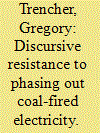| Srl | Item |
| 1 |
ID:
166976


|
|
|
|
|
| Summary/Abstract |
Achieving temperature targets under the Paris Agreement requires urgent measures to curb construction of coal-fired power plants (CFPPs) and expediate the retirement of existing assets. As the world's fourth largest coal consumer, Japan's efforts to reduce coal usage are critical for international climate mitigation. Policies introduced after the Fukushima nuclear disaster have led to a rapid increase in solar. However deregulation of the electricity market has also prompted a rush of new CFPP constructions by new market entrants and incumbent utilities. In parallel, Japanese state agencies and industry are actively exporting CFPP technologies to developing countries. Although these domestic and international actions harbour serious consequences for global climate mitigation efforts, greater understanding of the factors driving Japan's coal dependency is needed to limit further lock-in of future carbon emissions. Filling this gap, this study critically examines narratives employed by actors in government and industry to sustain Japan's domestic and international coal industry. Our analysis shows how Japan's fossil fuel regime is employing recurring narratives to promote continuation of the current coal-based energy system and to mobilise further investments in high-efficiency coal power technologies. We conclude by recommending various policy pathways and institutional reform measures aimed at encouraging wider diffusion of renewable electricity sources while reducing coal dependency.
|
|
|
|
|
|
|
|
|
|
|
|
|
|
|
|
| 2 |
ID:
146074


|
|
|
|
|
| Summary/Abstract |
JOHN S. DUFFIELD discusses the evolution of Japanese energy policy since the tragic events at Fukushima Daiichi in March 2011. He finds that deep divisions over nuclear power have stymied the development of a new political consensus on the role it should play in addressing the country’s energy needs and concerns about climate change.
|
|
|
|
|
|
|
|
|
|
|
|
|
|
|
|
| 3 |
ID:
191232


|
|
|
|
|
| Summary/Abstract |
This review provides a new perspective on issues about Japan's energy policy, emphasizing inherent justice failings in the country's energy policy framework—energy security, economic efficiency, environment, and safety (3E + S). To do so, we integrated a conceptual framework of energy justice synthesized from a review of the energy justice literature into a review of Japan's energy policy discourses, particularly the positioning of the 3E + S framework and its institutional basis in relation to the changes after the Fukushima nuclear disaster. The analysis revealed that besides a few fruitless attempts to integrate aspects of justice into energy policymaking in the immediate aftermath of Fukushima, the energy policy framework enforces the energy security paradigm of the post-oil shock period and carries inherent justice failings. This points to the normalization effect of injustices through institutionalization under the influence of the nuclear power industry. The analysis indicates a need to rethink the current 3E + S framework to integrate a framework of energy justice that addresses the inherent justice failings into energy policy decision-making beyond the energy security and economic growth paradigm, increasingly urgent needs as Japan works toward achieving its net-zero CO2 commitment and its overall climate-change alleviation goals by 2050.
|
|
|
|
|
|
|
|
|
|
|
|
|
|
|
|
| 4 |
ID:
125396


|
|
|
|
|
| Publication |
2013.
|
| Summary/Abstract |
The accident at the Fukushima Daiichi nuclear power station received worldwide attention in March 2011; since then, much of the reporting has been limited to stories such as the state of the reactor, the trans-Pacific movement of flotsam caused by the tsunami, and the effect of the tsunami and accident on Japanese communities. Other than the closure of Japan's last operating reactor in May 2012, little has been discussed outside of Japan regarding the policies introduced in response by the Japanese government in its effort to maintain Japanese energy security and the effects on Japan's electricity suppliers and the Japanese people.
This paper presents a detailed examination of the crisis-driven changes to policy and regulations instituted by the Japanese government and electricity suppliers in the immediate aftermath of the accident up to May 2012. The disruption to Japan's long-term energy policies is discussed in terms of the country's need to maintain its energy security. The paper also considers a number of different energy futures for Japan in light of the accident and how they could improve energy security in terms of availability, affordability, and acceptability.
|
|
|
|
|
|
|
|
|
|
|
|
|
|
|
|